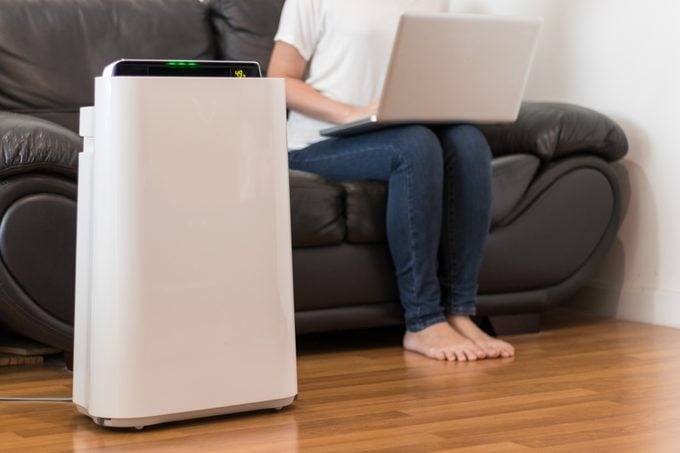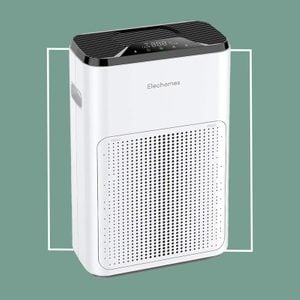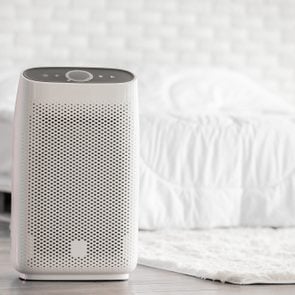How to Choose the Best Air Purifiers for Asthma
Updated: Jun. 18, 2021
A portable air purifier may help you breathe easier if you have asthma. Here's when you might need one and how to choose the best air purifier for you.
Feeling short of breath
Nearly 8 percent of American adults live with asthma, or inflammation of the airways, reports the Centers for Disease Control and Prevention (CDC). The very challenging news: There is no cure.
But once diagnosed—and with a pulmonary expert, respiratory therapist, immunologist, or allergist guiding you along—you can make lifestyle changes and begin a treatment program that will dramatically improve your quality of life.
Signs, symptoms, and causes of asthma
Often at their worst early in the morning or late at night, asthma symptoms include difficulty breathing, chest tightness, wheezing, and coughing. The airways of people with asthma are always inflamed, and when exposed to an environmental trigger (say, wildfire smoke, dust, pet dander, mold, or another allergen) they may experience an asthma attack. During an attack, all of those symptoms worsen, according to the American Academy of Allergy, Asthma, and Immunology (AAAAI).
About 60 percent of people with asthma also have allergies, a combo condition called allergic asthma, reports the Asthma and Allergy Foundation of America (AAFA).
People with a family history are more likely to develop asthma. Compared with other types of asthma, allergic asthma is most likely to have a genetic component.
Additionally, environmental and occupational factors can all play a role in the development of asthma.
(Read how a bee pollen allergy triggered one woman’s adult-onset asthma.)
Indoor air vs. outdoor air
The quality of the air in your breathing environment plays a huge role in the severity of asthma symptoms. And we’re not just talking about walking past a cigarette smoker on the sidewalk or living in a city with polluted outdoor air. Poor indoor air quality is shockingly common, says John McKeon, MD, founder and CEO of Dublin, Ireland–based Allergy Standards. The company operates the Asthma & Allergy Friendly certification program in the United States alongside the AAFA.
“Americans spend about 90 percent of their time inside, and that indoor air can be two to five times more polluted than outdoor air,” Dr. McKeon notes.
With many Americans spending more time at home due to coronavirus-related shutdowns, the quality of that indoor air is even more important for asthmatics to consider.
(Learn the 12 things that might be sneakily polluting your home’s air.)

Air purifiers for asthma
Covid-19-related shutdowns are a driving force behind the boom in the air purifier market—it saw a 57 percent growth rate in 2020 alone, per January 2021 data from Verify Markets. In addition to people investing in the air cleaners to potentially trap bacterial and viral particles, those who began working (and dining, exercising, studying, and more) at home, were more exposed to home-based environmental triggers, especially when the home was filled with people and pets.
“Human activity can have an impact on the level of allergens and particles in the air indoors,” Dr. McKeon says. “When we walk or move around a room, we disturb dust and particles on the floor, causing them to become airborne, where they can enter the airways.”
(These are the times in life you should consider buying an air purifier.)
Who will benefit most from an air purifier?
If your home is not equipped with an HVAC system that has a high-efficiency filter, Dr. McKeon says a portable air cleaner might be your next best option to remove fine particles from the air and reduce your exposure to harmful pollution during a wildfire.
Air purifiers can be beneficial for people with asthma in a couple of situations, explains Janna Tuck, MD, a spokesperson for the American College of Allergy, Asthma, and Immunology (ACAAI) and an allergist in Santa Fe, New Mexico:
- When the overall air quality is poor, especially when there is wildfire smoke that might sneak in through windows and doors
- If a person with asthma has a pet and is allergic to it
“Potentially all types of asthma could benefit from an air purifier, but not all asthmatics need one. The cost-benefit ratio is low for most asthmatics,” Dr. Tuck says. “Air purifiers are most helpful for asthmatics with pet allergies.”
If you’re considering investing in one, discuss this with your doctor to weigh the pros and cons. And know that even the best air purifiers for asthma have limits: “You can’t expect them to work for the whole house, so I usually recommend that if the patient only has one air purifier, it should go in their bedroom,” Dr. Tuck says.
How to select the best air purifier for asthma
Keep an eye out for the Asthma & Allergy Friendly logo. The certification program from the AAFA distinguishes the most effective air purifiers, and the machines with that mark on their packaging have been proven to remove 99.97 percent of dust, pollen, mold, bacteria, and any particles with a size of 0.3 microns. The state of California provides a list of certified mechanical and electronic air cleaners.
“The air purifier should have a HEPA filter,” says Dr. Tuck. HEPA (high-efficiency particulate air) filters remove 99.97 percent of allergens from the air, as well as airborne particles 0.3 microns in size.
“There are other technologies, like charcoal filtration, but those don’t have a lot of scientific data regarding asthma,” Dr. Tuck says. “A good air purifier for asthma has a filter that can either be cleaned or replaced.”
Follow manufacturer instructions for cleaning, as each machine is different. Be aware of how to service and clean the unit. As Dr. Tuck notes, it is not effective if it isn’t kept in good working order. (Don’t miss 20 little things most of us forget to clean.)
Both Dr. Tuck and the ACAAI say to steer clear of “ionic” air purifiers. These can generate ozone that’s harmful for people with asthma, essentially blowing contaminants onto walls and surfaces; they have the potential to make symptoms worse.
And try to size things right: Since air cleaners are designed for a specific room size, it’s important to select the right machine for the room. An underperforming device will not clean the room’s air as it should, Dr. McKeon says.
Portable and multiple air purifiers
A single portable air cleaner can be a cost-saving option if you typically don’t use more than one room at a time. You can move the air purifier to the bedroom in the evening, for example. Or you can stock up on more than one air purifier for asthma.
“Having several devices may be more convenient for some, especially when more than one person in the home is affected by asthma or allergies,” says Dr. McKeon.
That’s exactly why Kathy Przywara—who has lived with the airway-restricting condition for 25 years—invested in three air purifiers for her home during spring 2020. One lives in the master bedroom of her Mountain View, California, home. Another is in the bedroom of her son, who has allergies, and the third is in her office, “where I spend a significant amount of time.”
These were especially beneficial during the 2020 wildfire season, California’s worst on record. Even after the wildfire season ended, however, Przywara has continued to feel the difference. “I didn’t realize previously how air quality impacted my asthma,” she says.
Her symptoms—especially exercise-induced asthma—have not completely disappeared but seem to be less severe. “I will absolutely keep using the purifiers moving forward,” she says.
(Learn the asthma triggers you can avoid.)
Breathing easier
So, when will you start feeling better? “Just as the onset and severity of asthma and allergy symptoms can vary in different people, any changes in symptoms will also vary between individuals and may depend on a variety of factors, including how effectively an air cleaner can remove allergens from the air,” Dr. McKeon says. A noticeable change in allergy and asthma symptoms might not be immediate, but that doesn’t mean an air purifier isn’t working.
Vacuuming, dusting, and doing laundry are crucial. These and other forms of cleaning help manage asthma and allergies, and help limit or remove allergens, such as dust and pet dander, from the indoor environment. An air purifier can be part of—not the only—solution, Dr. McKeon says.
“It depends on the reasons the asthmatic decided to purchase the air purifier, how severe their asthma is, and how much their environment is affecting their asthma control, but my best educated guess is that an asthmatic might feel the difference in a few weeks,” Dr. Tuck says. “The allergen and irritant levels have to be lower for a while before the asthmatic inflammation is reduced enough for the patient to perceive the change.”
Keep up with air purifier maintenance, home cleaning, and your doctor-prescribed treatment program, and you might soon be breathing your best.



